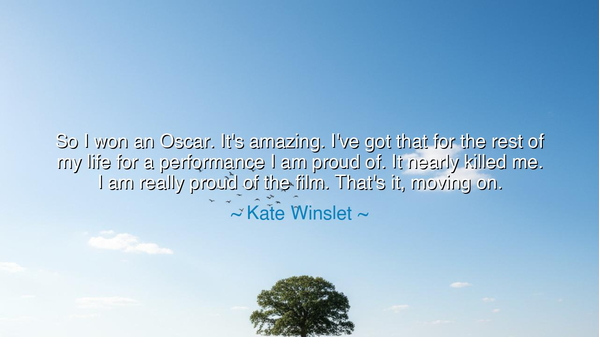
So I won an Oscar. It's amazing. I've got that for the rest of
So I won an Oscar. It's amazing. I've got that for the rest of my life for a performance I am proud of. It nearly killed me. I am really proud of the film. That's it, moving on.






The words of Kate Winslet — “So I won an Oscar. It’s amazing. I’ve got that for the rest of my life for a performance I am proud of. It nearly killed me. I am really proud of the film. That’s it, moving on.” — resound like the echo of an ancient bell, struck not for vanity, but for truth. The essence of her statement is not merely about victory, but about the weight of striving, the suffering behind triumph, and the wisdom to let go of laurels once they are won. For the ancients knew: the prize is not the end, but the stepping stone, and to clutch it too tightly is to turn it into dust.
Winslet speaks of the Oscar, that golden idol of her craft, but her words betray no idolatry. She marvels at the permanence of the honor — “for the rest of my life” — yet quickly reminds us that permanence is not purpose. The true jewel lies in the performance itself, the battle endured, the scars earned in silence, the invisible exhaustion that “nearly killed” her. Thus, in her humility, we hear the whisper of an eternal teaching: the crown is precious only because of the struggle it represents.
Consider the tale of Phidippides, the runner of ancient Greece, who carried news of victory from Marathon to Athens. His feet blistered, his lungs scorched, and his body broken — yet his sacrifice immortalized him. Like Winslet’s confession, his triumph was both glorious and costly. The message endured, but the man fell lifeless. So too with every victory: the world sees the shining token, but only the bearer knows the price.
Her words, “That’s it, moving on,” are no less powerful. Here speaks the wisdom of impermanence. For how many warriors have been undone by clinging to past glories, like Alexander’s generals, who fought over the shadow of his conquests, forgetting the future? Winslet, instead, casts off the weight of her honor, knowing that to dwell too long upon a single triumph is to rot in its shadow. The moving on is not dismissal — it is liberation.
The teaching is clear: pride without attachment. Be proud of what you have endured, what you have built, what you have earned — but do not bind your soul to it. For victories, however golden, can become cages if we mistake them for the summit. The ancients knew that the climb never ends; the summit of one mountain only reveals the foothills of another. To keep walking is to remain alive.
Let this lesson be woven into your life: when you achieve something great, rejoice with all your spirit. Celebrate, breathe in the sweetness, and know that no one can take that labor from you. Yet, do not let it anchor you to yesterday. The river of life demands you keep moving. Do not drink so long from one cup of glory that you thirst in the desert beyond.
Practical wisdom follows: when you finish a great task — whether it be a project at work, a creation of art, or a personal goal hard-won — pause and honor yourself. Write of it in your journal. Share it with those who love you. Then, set your eyes forward. Begin again, however small the next step may seem. For it is in the rhythm of striving, achieving, and releasing, that the spirit grows mighty and unafraid.
Thus, the flame of Winslet’s words endures as a torch for those who walk after her: be proud, endure the cost, embrace the victory, and then — move on. For only in moving on shall we find new battles, new triumphs, and a life ever unfolding, rich with purpose and strength.






AAdministratorAdministrator
Welcome, honored guests. Please leave a comment, we will respond soon